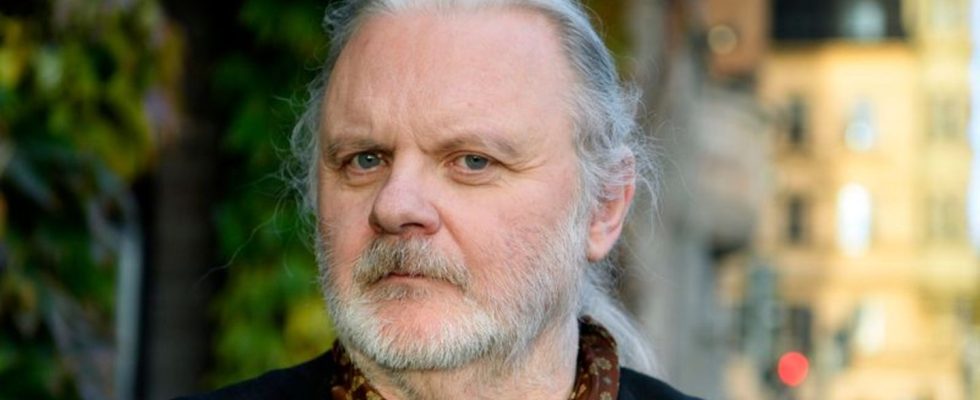Nobel Prize winner for literature
Shaped by life on the fjord: Who is Jon Fosse?
Author Jon Fosse was awarded the Nobel Prize in Literature this year. photo
© Jessica Gow/TT News Agency/AP
Dark and silent plays made the Norwegian Jon Fosse famous. Now he has been awarded the Nobel Prize in Literature. What influenced his work?
Seclusion, peace. And the sea. The area where the playwright Jon Fosse grew up says a lot about Jon Fosse the person.
He spent his childhood and youth in a small village on a fjord on the west coast of Norway. Here he found inspiration for his prose and plays, which have been translated into 40 languages and have been performed on major stages around the world since the mid-90s. His compatriots celebrate him as the most successful Norwegian playwright since Henrik Ibsen (1828-1906, “Peer Gynt”, “Nora or A Doll’s House”). Since Thursday he has been their new Nobel Prize winner for literature.
Silence instead of hustle and bustle
Despite his fame, even as an adult, Fosse preferred the quiet of small towns to the hustle and bustle of big cities. His retreat near Bergen, for example, or the Austrian town of Hainburg an der Donau, where he temporarily lives with his Slovakian wife in order to be very close to their homeland. This is his third marriage and Fosse has five children in total.
The Norwegian himself was born and grew up on the fjord-dominated west coast on September 29, 1959. Language – be it in poetry, on stage or elsewhere – occupies a central place in Fosse’s life. His novels and plays often have something melancholic, dark and mystical about them. His most recent work, published in German, is the novel “I am another” (Rowohlt Verlag).
After his debut literary work “Red, Black” (1983), Fosse published novels, volumes of poetry, collections of essays and children’s books. The religious, mystical element in his stage plays came from deep within himself. After leaving the Protestant church, he first belonged to the Quakers, then converted to Catholicism in 2013. He talked about this change in the religious community, among other things, in the book “Secret of Faith,” which was published in Norway in 2015. In the same year he told “Deutschlandradio”: “You cannot approach faith scientifically. Because then God does not exist. He is behind everything that exists.”
What are Fosse’s protagonists like?
Fosse’s protagonists are often deeply depressed and their life plans have failed. The “Frankfurter Allgemeine Zeitung” called its theme in 2001 “Spiritual lostness and outsiderness in seemingly warm communities.” “Directors and actors are fascinated by the clear language, which has a very musical effect with its repetitions and pauses.”
Fosse made music as a young person; he wrote his own songs and played the guitar. Later, he hardly listened to music anymore, as he told the “Neue Zürcher Zeitung” in an interview in 2014, “at most Bach.” At least with that, Fosse said, he didn’t go crazy.
Fosse has already written a wealth of works and has received many awards. His first drama in German, “The Name”, won him the Ibsen Prize and the Austrian Theater Prize. His pieces “The Night Sings Its Songs” and “Dream in Autumn” were also successful. In 2002 he received the Scandinavian National Theater Prize for “Death Variations” and in 2003 he received it for his complete dramatic work.
Public appearances as a burden
But the public appearances associated with working in the theater put a strain on him. “Jon Fosse is a hypersensitive person,” the “NZZ” wrote about him in 2014. “Social pressure is affecting him. He used to only be able to withstand public appearances thanks to alcohol; when he could no longer control the alcohol and was controlled by it, he stopped drinking – and appearing in public.”
Later, Fosse devoted himself more to prose, but also poetry. In 2014 he received the Strasbourg European Prize for Literature “for his body of work as a playwright, novelist, poet and essay writer, for his strong, sophisticated and innovative writing in every literary genre.” The following year he also received the Nordic Council’s Literary Prize.
Since 2011, Fosse has been able to retreat to a very special place to write. Norway has honored its famous citizen with the state artists’ residence “Grotte” on the edge of Oslo Castle Park. The house, which originally belonged to the poet Henrik Wergeland (1808-1845), has been made available to a major Norwegian artist for life since his death.

